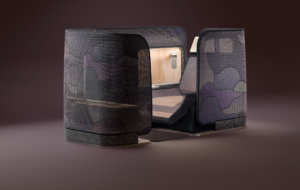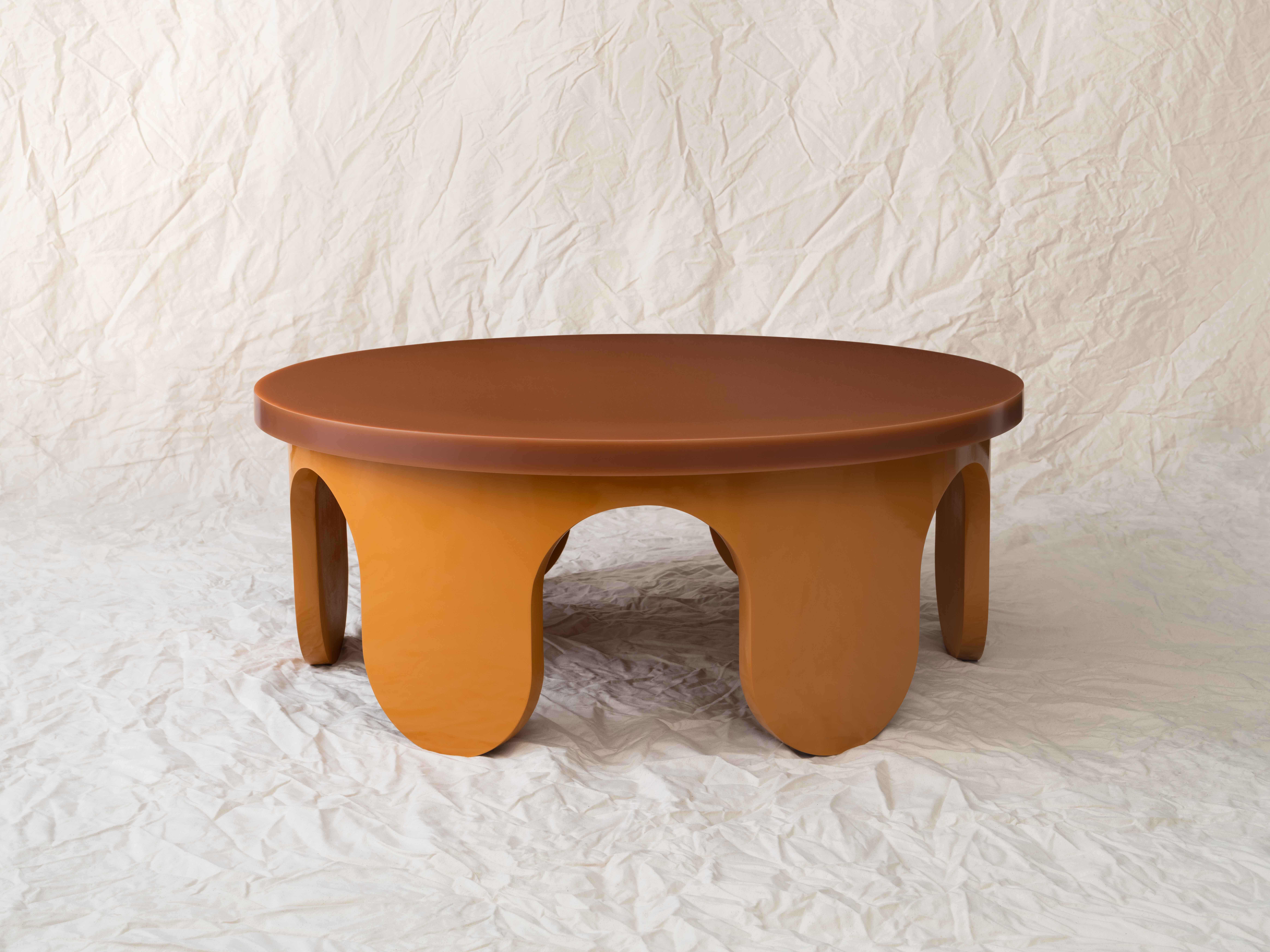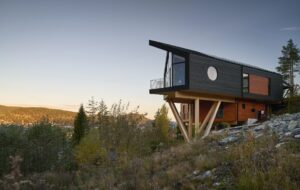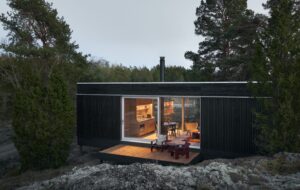

words Marcus Fairs
Why can’t all property developers be like Tom Bloxham?
His candid blue eyes are fixed on the next deal, but he’s got a broad enough focus to care about his schemes and their effect on communities. He’s just turned 40, but he’s got the youthful enthusiasm to carry off his trademark goatee and bleached crop. In the organised chaos of an office where real work gets done, Bloxham isn’t out to impress. He doesn’t have to: the architecture he commissions does that for him. “You have to get the best potential out of every bit of land. That’s what architects want, and what we want as well,” he says earnestly.
Bloxham is co-founder and chairman of Urban Splash, the Manchester-based developer that last month marked ten years of financial success and architectural awards. The company is celebrating with an ambitious piece of brand extension, a debut in the hotel business. Not surprisingly, the designers’ developer has bought a designers’ hotel. The Midland in Morecambe is a decaying art deco beauty, a 1933 modernist icon once described as a “graceful liner” but now lost at sea. Urban Splash is applying for planning permission to refurbish the Midland and re-open it as a hotel.
Urban Splash could strike a deal with a specialist hotel operator, but its chairman and co-founder Tom Bloxham has been mentally restoring the Eric Gill mouldings and the faded murals. “I do fancy the idea [of an Urban Splash hotel],” he says. “We’ve got a very strong vision of what the hotel should be like, and if we don’t find an operator to share our vision, we may very well do it ourselves. I’m pretty good at property, and I’ve got an interest in a bar company that’s very successful, so maybe the hotel is a marriage of opportunity.”
It’s very Bloxham, and very Urban Splash. He’s a deal junkie and a design aficionado, who’s wheeler-dealed his way since his first gig selling posters and never had a development that hasn’t won or been shortlisted for an RIBA award. The company, which celebrated its tenth anniversary last month, has made its name by doing things differently; taking on projects others wouldn’t touch, and re-inventing itself when the market evolves. In other words, it’s a fair bet that style-conscious weekend breakers will one day be checking in to the Midland for a taste of the Urban Splash experience.
The idea raises the kind of question that branding consultants ask: if our client was a drink/car/hotel, what would it be like to sip/drive/stay in? An Urban Splash hotel would pride itself on attention to design detail, from the cutlery to the curtains. It would be aspirational, but the pricing wouldn’t be outrageous. It would have a youthful sense of fun, and the self-assurance of an established reputation. And it would be very profitable: Urban Splash made £4.9 million on a turnover of £25m in 2002.
Urban Splash started by developing warehouses in north Manchester when no one thought there was a market outside Clerkenwell. Once other developers cottoned on, it moved on to the tougher challenge of developing new-build apartments in the city’s Castlefield district. By the time the coat-tail hangers set up camp there, Bloxham was already expanding into Liverpool and Birmingham. By paving the way for others to follow, Urban Splash has helped – as Bloxham says – detach the word “urban” from “deprivation, decline, and crime” and switch it to “modern, funky and aspirational”.
Now, the hotel is just one part of an ambitious brand extension. In leafy Altrincham, Manchester Urban Splash is putting the urban back into suburban with a Foster & Partners-designed apartment block. It is developing the first prefabricated scheme for owner-occupiers, where prices will start at around £100,000. Other schemes include refurbishing six empty Manchester council tower blocks for private sale, and converting the Rotunda in Birmingham into flats.
But the most dramatic new direction is Bloxham’s decision to take the company – and its commitment to architecture and design – on to the very bottom rungs of the property ladder. In the Seedley-Langworthy district of Salford, the company plans to redevelop around 400 two-up, two-down properties for an affordable £50,000 (see icon 006). And at the New Islington Millennium Community in east Manchester, the depopulated Cardroom council estate will be reborn as a mixed-used community under a Will Alsop masterplan.
“It’s about finding solutions for tricky sites,” Bloxham says, summing up the company strategy. “Where there’s an obvious solution, there’s usually other people who can do it. But where there’s this council estate, or a bit of Manchester that’s stood empty for years, or the Midland Hotel, that’s where we come in.”
That’s where Bloxham can use the skills he’s honed since he was “a kid buying and selling things at jumble sales” to put together deals with funders, local authorities and agencies such as English Partnerships. And the Bloxham who’s bought so many designer chairs that his wife complains he could open a shop, can apply his love of design and architecture to make the ordinary aspirational, and the aspirational unmissable.
Manchester architect Ian Simpson, who has worked with Urban Splash since the early days, has watched it generate demand where none previously existed. “They try to push preconceived boundaries in the market; they’ve changed the perception of areas, and even their names. Castlefield used to be St George’s Hulme, but that doesn’t have the same ring to it! And they’ve taken risks others wouldn’t. The second-rate developers hang back and let the innovative companies like Urban Splash create value for them – it must be frustrating for them.”
But since Bloxham believes that profit and good design are indivisible, he’s happy if his example means other developers make the same connection. “Housing has definitely improved – a few years ago everything was horrendous. Some developers are beginning to use good architects – at least architecture’s on the agenda, and that’s ten steps forward. We’ve shown there’s an opportunity to make more money by doing good stuff, and the brighter ones have listened.”
Even so, Castlefield itself is a good example of the qualitative difference between Urban Splash and the competition. On one side of the road, mainstream developers have built red-brick mock-mills, and blocks of apartments with over-excited faÂades. Meanwhile, Urban Splash has reincarnated an art deco warehouse as the Box Works, the confident lines of the original abutting a new lateral faÂade in floor-to-ceiling glass that never goes out of fashion. Next door, the concrete and glass combination of new-build Timber Wharf is calm, regular and rhythmic.
Attention to detail is evident everywhere, and Bloxham personifies the company’s perfectionism. “He’s interested in the cornicing, the signage, the common parts. And he’s as interested now as when we met eight years ago – the attention to detail hasn’t stopped,” says Glenn Howells, architect of Timber Wharf. Bloxham proves his point when he flicks through a laptop presentation of upcoming projects, stopping at a shot of a stylish kitchen: “Look at that line! You can’t see a single socket or air vent.”
Bloxham, 40, says he’s been committed to good design since he met his business partner, the architect Jonathan Falkingham, in 1991. At the time, Surbiton-raised Bloxham had stayed on in Manchester after studying politics and history there, and had graduated from running a poster business to landlord of Affleck’s Palace, an indoor market catering to the city’s music and clubbing economy. There was clearly a bit of the barrow boy and Jack-the-lad in Bloxham in those days – he tells the story of how he needed some gravitas to be taken seriously by bigger players, so stuck a customised “100 Tom” number plate on his beaten-up Jag.
The up-and-coming developer worked with up-and-coming Manchester practices such as Ian Simpson Architects and Stephenson Bell, and the resulting design awards raised the profile of the client and the designers. Now the company has grown up, it has commissioned grown-up architects like Norman Foster and Will Alsop. But Urban Splash also trawls for talent in open design competitions, and has recently appointed Fat to renovate 1970s council terraces in New Islington.
The reputation for good design is important to Bloxham: awards take up an entire wall of the Urban Splash reception in Timber Wharf. “Part of it is just the sense of satisfaction, a personal thing of why not do the best you can?” he says. That aspiration applies not only to architecture, but also to marketing literature, videos and CD-roms, where he also hopes to win awards.
But one award is represented by a photocopy: the original of his MBE certificate must hang in more personal space. It was awarded in 2002 for services to architecture and regeneration, and demonstrates how highly Bloxham is regarded in government and public sector circles. He has held a formal advisory post at the Office of the Deputy Prime Minister, and has followed it with informal letters to John Prescott outlining his ideas on regeneration and housing policy.
“In speeches, he always uses the Athens quote, about leaving cities better than you found them. There is that drive to be known for doing good work,” says Simpson. He believes that the New Islington and Salford schemes are “not just for financial reasons, but because [Bloxham] is fortunate enough to be instrumental in changing cities and bringing them back to life. That’s a passion that drives the company.”
But Bloxham himself prefers to stress the profit motive over the social vision. “Ten years ago, there was a fantastic, underused resource in Manchester centre. Now, there are other resources out there. There’s a doughnut of low-rise social housing and areas of under-used land. In any business, being successful is about added value, and it’s easiest to add value where the value’s lowest.”
But surely, as Simpson suggests, there is pride in changing the social fabric of a run-down area, as well as the physical fabric? Bloxham shakes his head firmly. “I think you give us too much credit. What we do has significantly changed the face of cities, without question. But our motivation is to create great buildings; we are not a philanthropic, evangelical organisation. I don’t want to put myself forward as some sort of saviour. As soon as you do that, you get knocked down.”
He also emphasises the profit potential in affordable and key-worker housing, which he sees as Urban Splash’s opening into the London and south-east markets. “It’d be a great challenge to provide really well-designed affordable housing, and to integrate it with mainstream housing. There’s so much money invested in building poor-quality social housing that no one wants to live in. It’s a huge market, and very exciting.”
A government golden boy making money out of a national housing crisis and low-income communities? It might sound tasteless, as if Bloxham was proposing to rent beds to the NHS, but Urban Splash has shown there’s no contradiction between profit and good design, so why should there be one between making money and building homes people want to live in?
After all, the history of Urban Splash shows that what creates profit for Bloxham creates financial and aesthetic value for wider areas. It’s a virtuous circle. As Bloxham says: “Sure, we’ve had an uncanny knack of picking up-and-coming areas. But really it’s about creating self-fulfilling prophecies. People start to get confidence that things are changing.” As Urban Splash moves into new markets and a second decade, Salford and Morecambe won’t be the only places hoping for a splash of the Bloxham effect.


















